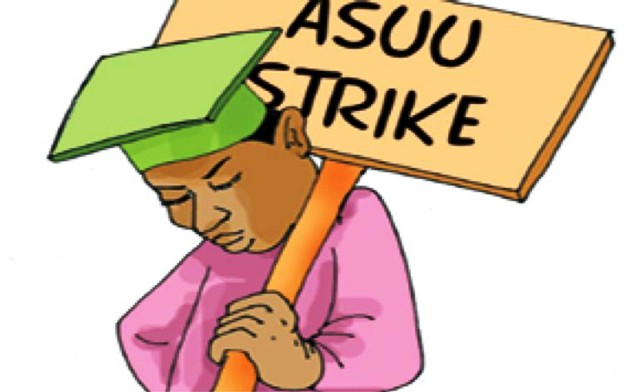Editorial
FG, ASUU And Tertiary Education

Last week, the Academic Staff Union of Universities (ASUU) declared an indefinite strike consequent upon the inability of the Federal Government to implement the agreement it reached with it since 2009, on ways to better the standard of the nation’s public universities.
National President of ASUU, Professor Biodun Ogunyemi, declared : “Based on a nationwide consultation with our members, an emergency meeting of the National Executive Council (NEC) of ASUU rose on August 12, 2017 with an indefinite strike action starting from Sunday, August 13, 2017. The nationwide action is total and comprehensive. During the strike, there shall be no teaching, no examination and no attendance of statutory meetings of any kind in any of our branches”.
Some of the agreements ASUU hinged its action on include the Federal Government’s failure to pay intervention fund as contained in the NEEDs assessment report which has accumulated to N880 billion; non release of N1 billion annual allocation as operational licence; the breach of the 2003 MoU for the release of N1.3 trillion over the period of six years for the revitalisation of universities and the granting of autonomy.
As was to be expected, the declaration of the indefinite and total strike action has thrown the nation’s education system, in particular, the long-suffering and economically traumatised students and their parents into another round of anguish. And more worrisome is the hopeless picture regarding the immediate resolution of the current strike.
Last Friday, the meeting held between the Federal Government and ASUU to resolve issues ended in a deadlock. Speaking after the meeting, the Minister of Labour and Employment, Senator Chris Ngige, said: “The major issue is for us to see that our children can go back to school and ASUU graciously said they would come back to us on a date within the next one week.”
On his part, the Minister of Education, Adamu Adamu, who admitted that the government was at fault, however, promised that the strike would be called off soon as the sum of N53 billion would be released to the union. Speaking during his appearance before the Senate Committee on Tertiary Institution and TETFUND, the Minister disclosed that the Federal Government had commenced plans to ensure that it honoured the agreement with ASUU. He noted that “ASUU asked for N23 billion to be paid, but we said the condition for getting the N23 billion was for them to account for the N30 billion they had taken and they were not able to account for it”.
The Tide takes exception to the seeming lackadaisical attitude of the Federal Government in handling the agreement reached with the university teachers. We consider it unconscionable for the government to wait for ASUU to declare a strike before taking steps to honour the terms of the agreement it freely reached with the union.
We hold that if, as the Education Minister said, the government had been hamstrung by the refusal of the union to account for the N30 billion it had collected previously, it should have made its position known to the public before now. And that done, it would have been easier for Nigerians to have a clearer grasp of the issues at stake.
On the part of ASUU, we find it worrisome that it needed to be asked to account for the money previously collected before doing so. We believe strongly that a union attuned to the values of accountability and transparency would not have needed to be told to do the right thing.
But even more fundamentally, we think that the present state of the nation’s economy cannot back ASUU’s demands. Therefore, meeting ASUU’s immediate demands may not be a realistic solution in the long run.
It is against this backdrop that The Tide urges the government, ASUU and other critical stakeholders in the education sector to join hands in the effort to find a lasting solution to what has become a disturbing national challenge. In doing this, the Federal Government should take the initiative not only to end the current strike but also evolve a holistic way to reposition tertiary education in our country.
There is no gainsaying the fact that the consequences of running battles between the Federal Government and ASUU which had often resulted in prolonged industrial strikes by the lecturers over the years, had dealt debilitating blow on our educational development; and has continued to pull our public universities down the ladder of academic ranking, even in Africa.
While we urge ASUU to exercise caution and demonstrate patriotism in its interface with the Federal Government, particularly in the face of the present economic reality, we cannot shy away from the fact that under-funding the education sector, over the years, has had collateral damaging effects on the country. It is on this premise we envisage amicable resolution of all the issues at stake for the collective well-being of Nigeria’s education sector.
Editorial
AFCON ’25: Bravo, Super Eagles, But…

Editorial
Fubara: Celebrating A Leader At 51

Editorial
Beyond Accessing Bonny By Road

-

 Politics22 hours ago
Politics22 hours agoPFN Rejects Call For INEC Chairman’s Removal Over Genocide Comments
-

 Sports22 hours ago
Sports22 hours agoEnekwechi wins Orlen Cup in season opener
-

 Rivers22 hours ago
Rivers22 hours agoFasthire, PHCCIMA, CIPM Host CareerFest 2026 In PH
-

 Sports22 hours ago
Sports22 hours agoFalconets, Senegalese Lionesses arrive Ibadan for qualifier
-

 Sports22 hours ago
Sports22 hours agoSimba open Nwabali talks
-

 Niger Delta23 hours ago
Niger Delta23 hours agoStakeholders Task INC Aspirants On Dev … As ELECO Promises Transparent, Credible Polls
-

 Business23 hours ago
Business23 hours agoNCDMB, Jake Riley Empower 250 Youths On Vocational Skills
-

 Niger Delta22 hours ago
Niger Delta22 hours agoTinubu, Jonathan, Diri Pay Last Respect To Ewhrudjakpo

